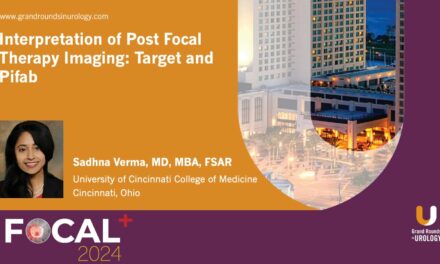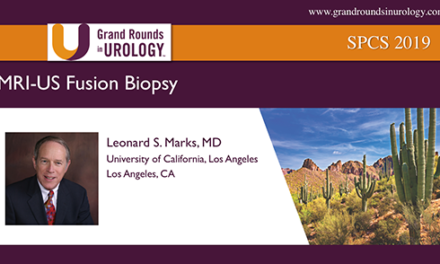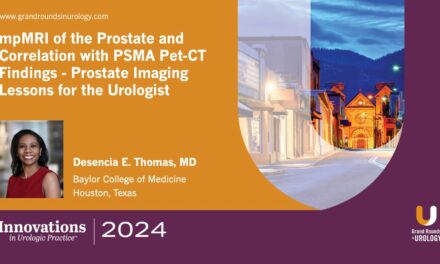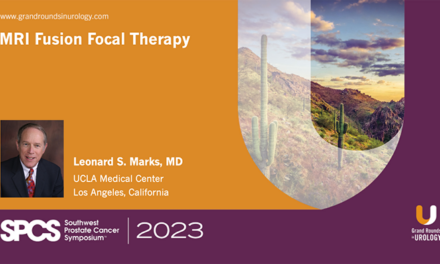Hashim Ahmed, MD, presented “IP1-Prostagram Screening Study: Comparing PSA, MRI and Ultrasound” during the 6th Global Summit on Precision Diagnosis and Treatment of Prostate Cancer on September 22, 2022.
How to cite: Ahmed, Hashim. “IP1-Prostagram Screening Study: Comparing PSA, MRI and Ultrasound.” September 22, 2022. Accessed Jun 2025. https://grandroundsinurology.com/ip1-prostagram-screening-study-comparing-psa-mri-and-ultrasound/
IP1-Prostagram Screening Study: Comparing PSA, MRI and Ultrasound – Summary
Hashim Ahmed, MD, Professor and Chair of Urology, Imperial College London and Chair, Prostate Research Group, National Cancer Research Institute, discusses the IP1-Prostagram Study. Dr. Ahmed begins by explaining what he calls the “reverse” evolution of magnetic resonance imaging (MRI), where at first MRI was used to localize prostate cancer for focal therapy, then to diagnose prostate cancer in secondary care, and now to screen for prostate cancer in the community (like mammography for breast cancer). He explains short (bi-parametric) MRI with a 12-minute scanning time, no contrast, and no endo-rectal coil and points out that sometimes prostate-specific antigen (PSA) screening can miss clinically significant cancers. Dr. Ahmed describes the Prostagram Screening Study design as a paired screen-positive design with two screening centers; participants included men aged 50-69 across seven primary care practices as well as community-based recruitment; each participant received an MRI, a PSA test, and an ultrasound. If any of the screening tests were positive, men were advised to have a prostate biopsy. In the study, the reporters were blinded to other tests and the participants were blinded to which test (if any) was positive. Study data showed that an MRI score of four-five identified more significant cancers than any other screening method tested. Dr. Ahmed explains data that indicate that the optimal screening scenario would be one which leads to the fewest biopsies but the greatest proportion of cancer detected. This would be accomplished with biopsy following a screening that included PSA of ≥ 1ng/ml then MRI ≥ 4. He describes the abbreviated prostate MRI—Prostagram—as a screening test in the community that finds more clinically significant prostate cancers than a PSA threshold of 3ng/ml. In combination with a PSA threshold of ≥ 1ng/ml, it has a lower biopsy rate but maintains its higher sensitivity in detecting clinically significant cancer. Dr. Ahmed asserts that the strategy requires testing in a definitive, comparative trial.
The Global Summit on Precision Diagnosis and Treatment of Prostate Cancer is a unique multi-disciplinary forum organized to inform the key health care stakeholders about the emerging advances in clinical case and research and create a consensus-based vision for the future of precision care and educational and research strategy for its realization. The mission of the Summit is to fill the currently existing gap between the key experts of in vivo imaging, the world authorities in the in vitro fluid- and tissue-based molecular diagnostics, including genomics, and thought leaders in the development of novel observation strategies (e.g., active surveillance, or AS) and therapeutic interventions.
ABOUT THE AUTHOR
Hashim Ahmed, MD, PhD is currently Professor and Chair of Urology at Imperial College London. Dr. Ahmed is an internationally renowned expert in prostate cancer diagnosis, imaging, and biopsy, and also focuses on minimally invasive therapies for prostate cancer. His research interests are in Health Technology Evaluation, including multi-parametric multiparametric resonance imaging (MRI), histoscanning, tissue type imaging, as well as therapeutic interventions such as high intensity focused ultrasound (HIFU), irreversible electroporation, photodynamic therapy, cryotherapy, and radiofrequency ablation.
Dr. Ahmed qualified from the University of Oxford where he attended St Peter's College and Linacre College. Whilst he was a student, he was awarded the William Osler Prize in Medicine. He then held house office posts in Queen Elizabeth Hospital, Birmingham and University Hospitals Manchester before returning to Oxford for an Anatomy Prosector post. Dr. Ahmed then held senior house jobs in surgery in the Royal Free Hospital, London rotation followed by specialist registrar posts at West Middlesex Hospital, Charing Cross Hospital/Imperial College, University College Hospital, and Watford General Hospital as part of the Imperial College Urology Rotation. Dr. Ahmed was a Pelican Cancer Foundation Research Fellow followed by a MRC Clinician Research Training fellowship at University College London, at which time a number of imaging and focal therapy trials were started. He currently holds a £2.1M Wellcome Trust Senior Clinical Research Fellowship and is Director of the Wellcome Trust Prostate Research in Imaging and Surgical Methodology (PRISM) Programme. A team led by Dr. Ahmed was recently awarded the BMJ/BMA Innovation Award 2015 and the Health Services Journal Acute Sector Innovation Award 2016.




